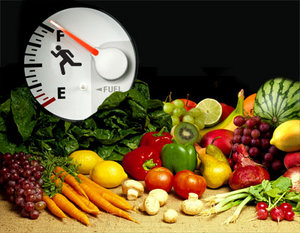What Your Body Needs
By Donald Hayes, DC
If you've ever struggled to stay awake after eating a heavy, fatty meal or tried desperately to concentrate at work on an empty stomach, you know how much food affects how your body functions.
For instance, let's take a look at the standard American diet (SAD) to see why most people feel tired and rundown after lunch. Many people think nothing of eating a double cheeseburger, medium fries and a medium cola. If you dissect this "meal," you'll find that on average, it contains an unbelievable 68 grams of fat (17 teaspoons), almost half of which are saturated; 15 grams of trans fatty acids; 150 mg of cholesterol; 1,200 mg of salt; and 20 teaspoons of sugar (all from the cola)! If you factor in that the fries were probably cooked in hydrogenated cottonseed oil, one of the most heavily pesticide-laden crops in the world, and that the meat, if overcooked, could contain carcinogens, or if undercooked, could result in food poisoning from
E. coli, you may agree it's time to find a new all-American meal.
The Bad Guys
High levels of saturated fat are consistently linked with elevated blood cholesterol levels, heart disease, insulin resistance and several forms of cancer. Most Americans eat about 40 grams of saturated fat every day, which is twice as much as is considered healthy. Animal products are the greatest source of saturated fats in the Western diet. Milk fat is more than 60 percent saturated, beef fat about 40 percent, chicken fat about 30 percent and fish fat about 20-33 percent. By comparison, plant fats are mostly in the 10-15 percent range.
 How much saturated fat should you eat? A 2002 report on diet and disease from the World Health Organization and the United Nations suggests optimal intake of no more than 7 percent of your total daily calorie intake. If you are eating 1,600 calories a day, you could choose to eat 4 ounces of steak, which will provide 10 grams of saturated fat, keeping you under the limit of 12 total grams. However, if you opt to eat 8-12 ounces of steak, you would be way over the top. On the other hand, if you skip the meat and stick to plant foods, you could eat 10 servings of fruits and vegetables, six servings of whole grains, one serving of beans, one serving of tofu, 1 ounce of nuts and 1 ounce of seeds - and still come in under your goal of no more than 12 grams of saturated fat!
How much saturated fat should you eat? A 2002 report on diet and disease from the World Health Organization and the United Nations suggests optimal intake of no more than 7 percent of your total daily calorie intake. If you are eating 1,600 calories a day, you could choose to eat 4 ounces of steak, which will provide 10 grams of saturated fat, keeping you under the limit of 12 total grams. However, if you opt to eat 8-12 ounces of steak, you would be way over the top. On the other hand, if you skip the meat and stick to plant foods, you could eat 10 servings of fruits and vegetables, six servings of whole grains, one serving of beans, one serving of tofu, 1 ounce of nuts and 1 ounce of seeds - and still come in under your goal of no more than 12 grams of saturated fat!
For many years, trans fatty acids were considered a relatively minor player in health and disease. Although their impact on total cholesterol is not quite as profound as it is with saturated fats, the overall damage to heart health is worse. Trans fatty acids not only raise total cholesterol, but also lower HDL cholesterol ("good" cholesterol) and potentially increase triglycerides. Gram for gram, the adverse effect of trans fatty acids is estimated to be two to four times greater than that of saturated fatty acids. Leading research suggests intakes of trans fatty acids should be less than 1 percent of calories. For someone eating 1,600 calories a day, that amounts to no more than 1.8 grams of trans fatty acids. In real life, that means you should avoid or minimize foods that contain hydrogenated fats or partially hydrogenated fats. The most common sources are crackers, cookies, granola bars, chips and other snack foods, baked goods, margarine, shortening and deep-fried fast foods. Trace amounts in breads, seasonings and other products are not as much of a concern.
Cholesterol is made by animals, not plants; all animal foods contain cholesterol, while plant foods are all cholesterol-free. The next time you buy any plant-based food like peanut butter that says "no cholesterol" on the label, realize that is just a sales gimmick. There are several concerns about eating too much cholesterol because it can cause blood cholesterol levels to rise, increasing the risk of blood clots, heart attack and stroke. The recommended daily intake of cholesterol is less than 200 mg, which is a little less than the amount of cholesterol in one egg yolk. By the way, the average American eats approximately 400 mg of cholesterol a day.

